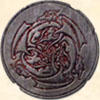Chapter 1 - Non-weapon Proficiencies
Tracking Non-weapon Proficiency
Characters with tracking proficiency are able to follow the trail of creatures and characters across most types of terrain. Characters who are not rangers roll a proficiency check with a -6 penalty to their ability scores; rangers have no penalty to their ability scores nor is there any cost for the Tracking proficiency. As with all proficiencies if a Ranger takes additional slots in Tracking they can acquire a positive modifier if desired.
Other modifiers that are also applied to the attempt include:
| Terrain type | |
| Soft or muddy ground | +4 |
| Thick brush, vines, or reeds | +3 |
| Occasional signs of passage, dust | +2 |
| Normal ground, wood floor | +0 |
| Rocky ground or shallow water | -10 |
| Every two creatures in the group | +1 |
| Every 12 hours since trail was made | -1 |
| Every hour of rain, snow, or sleet | -5 |
| Poor lighting (moon or starlight) | -6 |
| Tracked party attempts to hide trail | -5 |
- Characters with the animal empathy trait gain +2 to their proficiency score when tracking non‑domesticated animals.
- Characters with the animal lore proficiency gain +2 to their proficiency rating when tracking animals—either wild or domesticated.
- Characters with Ultravision have a -2 for poor lighting rather than the -6
These modifiers are cumulative--total the modifiers for all conditions that apply and combine that with the tracker's Wisdom score to get the modified chance to track.
For example, if Thule the Ranger's Wisdom score is 16 and he is trying to track through mud (+4), at night (-6), during a sleet storm (-5), his chance to track is 9 (16+4-6-5). For tracking to succeed, the creature tracked must leave some type of trail. Thus, it is virtually impossible to track flying or noncorporeal creatures. The DM may allow this in rare instances, but he should also assign substantial penalties to the attempt.
To track a creature, the character must first find the trail. Indoors, the tracker must have seen the creature in the last 30 minutes and must begin tracking from the place last seen. Outdoors, the tracker must either have seen the creature, have eyewitness reports of its recent movement ("Yup, we saw them orcs just high-tail it up that trail there not but yesterday."), or must have obvious evidence that the creature is in the area (such as a well-used game trail). If these conditions are met, a proficiency check is rolled. Success means a trail has been found. Failure means no trail has been found. Another attempt cannot be made until the above conditions are met again under different circumstances.
Once the trail is found, additional proficiency checks are rolled for the following situations:
- The chance to track decreases (terrain, rain, creatures leaving the group, darkness, etc.).
- A second track crosses the first.
- The party resumes tracking after a halt (to rest, eat, fight, etc.).
Once the tracker fails a proficiency check, another check can be rolled after spending at least one hour searching the area for new signs. If this check is failed, no further attempts can be made. If several trackers are following a trail, a +1 bonus is added to the ability score of the most adept tracker. Once he loses the trail, it is lost to all.
If the modifiers lower the chance to track below 0 (for example, the modifiers are -11 and the character's Wisdom is 10), the trail is totally lost to that character and further tracking is impossible (even if the chance later improves). Other characters may be able to continue tracking, but that character cannot.
A tracking character can also attempt to identify the type of creatures being followed and the approximate number by rolling a proficiency check. All the normal tracking modifiers apply. One identifying check can be rolled each time a check is rolled to follow the trail. A successful check identifies the creatures (provided the character has some knowledge of that type of creature) and gives a rough estimate of their numbers. Just how accurate this estimate is depends on the DM.
When following a trail, the character (and those with him) must slow down, the speed depending on the character's modified chance to track shown below:
| Chance to Track | Movement Rate |
| 1-6 | ¼ normal |
| 7-14 | ¼ normal |
| 14 or greater | 3/4 normal |
In the earlier example, Thule has a modified tracking chance of 9, so he moves at ½ his normal movement rate.
